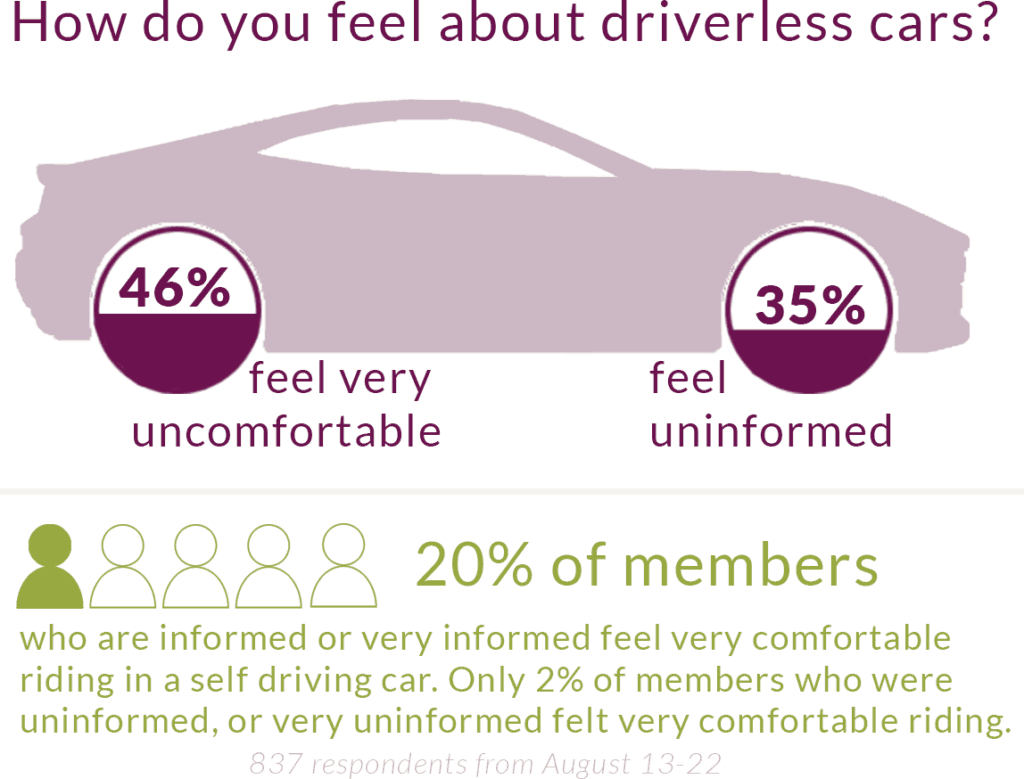

Reach: Self-driving Cars
|
Self-driving cars may soon be commonplace on the roads of North Carolina. Last week, Rep. David Price and the State Transportation Secretary James Trogdon discussed self-driving cars during a round table at NC State.They agreed that self-driving cars offer benefits for drivers, but said they would speak directly with auto manufacturers before crafting any legislation. While many of our Reach NC Voices users said they would feel uncomfortable riding in a self-driving car, this technology is already being used across the country. Lyft just announced that they have completed 5,000 self-driving rides in Las Vegas. Last week, Kroger launched a pilot using self-driving vehicles for same-day delivery of groceries in Scottsdale, Arizona. However, safety concerns about widespread automation of vehicles remain. Self-driving cars have to navigate accurately, reliably, and safely through a variety of conditions and environments that are often far from standardized. During this period of transition as the technology continues to improve, it’s likely that self-driving cars will continue to be deployed in relatively controlled environments (like theme parks) and in places where it’s more cost-effective (like urban areas). Every week, we write this newsletter based on how you respond to the question of the week. Your voice is needed. Our next question of the week is about community colleges. Click here to weigh in! |
What you told us about self-driving cars:






Five Facts:
21 states
North Carolina is one of 21 states to enact legislation around self-driving cars. North Carolina law regulates operation on public highways, does not require a driver’s license, and requires an adult to be in the car with children under 12.
1 of 10 testing sites
The Triangle Expressway in western Wake County is one of 10 locations nationwide selected by the federal government for autonomous vehicle testing. As of April, no company had yet tested on the 19-mile stretch of road.
94% human error
According to the National Highway Association, 94% of all car crashes are due to human error. Researchers estimate significant drops in fatal car accidents due to driverless cars in the coming decade.
2020 to market
Honda, Nissan, Toyota, Google, and Tesla have all announced launch dates for self-driving vehicles at or before 2020.
5 levels of automation
Level 1 is functionally like adaptive cruise control. By level 2, the car can steer, accelerate, and brake in some circumstances. Levels 4 and 5 are considered “driverless” in most circumstances.


Our Picks:
|
Uber’s Vision of Self-Driving Cars Begins to Blur | New York Times – 8/19/2018 |
|
A Day in the Life of a Waymo Self-driving Taxi | The Verge – 8/21/2018 |
Question of the Week:
Travel Notes:
Here’s where our team is going this week.
– This weekend, Caroline Parker is visiting Faison and Ramseur to cover back-to-school events at local churches.
– Next week, our entire team is hitting the road to visit all 58 community colleges across the state. Follow along online at EdNC.org or on Twitter by following @Awake58.




